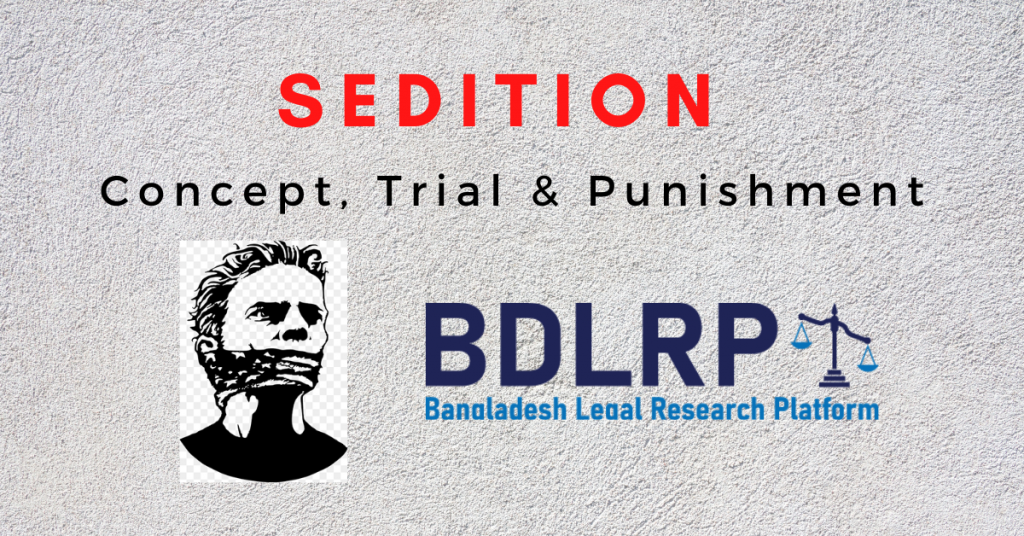Concept of Sedition:
In 1922, Mahatma Gandhi said before the court that he had nothing to hide from this court and that it had become a habit for him to express his displeasure with Sedition. The Oxford Dictionary defines Sedition as “Conduct or speech inciting people to rebel against the authority of a state or monarch.”
In detail, we can say, Article 39 of the Constitution of the People’s Republic of Bangladesh gives freedom of thought, conscience, speech, and expression. However, it is seen in our daily life that we do not comply with the above conditions, and we fight for freedom. Those who go beyond freedom and practice freedom in the name of free thought are breaking various laws, and becoming criminals can be punished with life imprisonment.
So, when a person creates or attempts to create hatred, animosity, or enmity against the government by his words or any of his writings or any symbol/hint/symbol used by him, that person will be legally considered a traitor. Moreover, this type of activity will be regarded as Sedition.
Legal Aspects:
According to section 124A of The Penal Code 1860, any person, who by any written/spoken words or by any sign, or by any visible activity, or something else, brings or tries to bring into any hate or contempt, or stimulates or tries to stimulate disaffection towards the government recognized by law shall be penalized. This offense is called Sedition.
Here, the term “disaffection” contains disloyalty and all spirits of enmity. Further, any comments expressing displeasure of the government’s measures to obtain their change by lawful means, without stimulating or attempting to excite hatred, contempt, or disaffection, do not constitute an offense. Furthermore, any comments expressing displeasure of the administrative or additional action of the government without stimulating or attempting to stimulate hatred, contempt, or disaffection do not constitute an offense, according to the section.
More descriptively, Sedition is –
- Any words, which may be either written or spoken or signs which include placards/posters (visible representation).
- Must carry hatred/disrespect/disaffection against the state.
- Must consequence in ‘imminent violence’ or public disorder.
Further, according to Article 7A of the Constitution of the People’s Republic of Bangladesh, if any person abets or by show of force repeals or suspends the Constitution of Bangladesh or any of its articles or disrupts or attempts to disrupt the confidence, belief, or reliance of the citizens to this Constitution, his such act shall be seditious and such person shall be guilty of Sedition.
For better understanding, we can see two examples:
- Ministers constitute the government, but they are not the government, so criticizing a minister does not mean criticizing the government. Apart from the ministry, the minister has other identities. The government is not hurt if the minister is hit personally or in his other identity.
- On the other hand, the judiciary does not come within the government. So the article that attacks the police falls under this section because the government conducts its work through the police.
Debatable Issues:
Although Article 124A gives the type of crime and the level of punishment, it is difficult for the general public to have a complete idea of Sedition. Because there is only talk of hatred, animosity, or enmity against the government, which is not made clear that the general public can guess the crime, exactly what actions are hateful, what actions are almost hateful, or how animosity hurts the government in speech or writing; these issues are mostly unclear.
Section 57 of our ICT Act, where the type of crime is correct, but the level is unclear, people cannot be aware if they do not understand the range, and at the same time, they are scared. Of all the reasons we see in criminology for a criminal to commit a crime, this one is also silently present.
When the law fails to limit the range of crime, some people will commit crimes without realizing it; on the other hand, some people will be scared, and the biggest problem will be a class of opportunists who continuously capitalize on the loopholes in the law and do politics.
Facts and Cases:
- In 2016, speaking at a panel debate on ATN News, Mahfuz Anam agreed that reports printed in The Daily Star in 2007 claiming corruption by Sheikh Hasina, now prime minister, were based on unsubstantiated leaks fed by the army Directorate General of Forces Intelligence. During the interview, he said it was a big mistake and admitted that it was a terrible editorial judgment. Despite his admission, he has been facing concerted attacks from the government and the ruling Awami League party. On or after February 18, 2016, 79 cases were filed against him, including 17 sedition and 62 defamation cases. He has rejected to resign and has defended himself in editorials.[1]
- Priya Saha, a Bangladeshi local, participated in the Second Ministerial to Advance Religious Freedom held at the US Department of State. On July 18, Priya, one of the organizing secretaries of Bangladesh Hindu-Bouddha-Christian Oikya Parishad, told the US president that “37 million Hindu, Buddhist and Christian people have disappeared from Bangladesh“. The speech was apprehended on a video and went viral on social media platforms.[2]
- The most crucial element in punishing an offender in any case, including a sedition case, is to prove whether the offender wanted to do it or not. If there is no intention or desire to create hatred, enmity, or animosity towards the government or to try to create it, no matter what a person says, it will not fall into treason.[3]
Trial Procedure:
Sedition is considered a severe crime in the Penal Code 1860, which is against the state. There are some legal measures regarding the charges of Sedition:
- Before constituting a case of Sedition, one must obtain sanction from the government from the Ministry of Home Affairs. Section 196 of the Code of Criminal Procedure (CrPC) requires state-government sanction before anyone is charged with Sedition. Without the government’s prior sanction, none can file a case of Sedition against others.
- Competent Court: According to Section 108 of the Code of Criminal Procedure, only the magistrate of the first-class and metropolitan magistrate can adjudicate the trial of a Seditious crime. Further, according to Schedule II, chapter 6 of CrPC, the competent court for Sedition is the Sessions Court, Chief Judicial/Metropolitan Magistrate, or any 1st class magistrate specially appointed by the government.
- The nature of the offense is Non-bailable and Non-compoundable.
Stages of Trial:
- On their first appearance in court, the accused may be asked to plead to the charge. In practice, the case will most likely be adjourned to allow the police more time to investigate. Once the police department has finished its investigation, it will report to the magistrate. If the magistrate does not accept the police report, they can refer it back to the police or release the accused.
- If a situation arises, the matter will go to trial. If the magistrate has sufficient power to hear the case, the trial will occur in their court. If not, the case will be transferred to an appropriate Court for the trial mentioned above.
- The trial starts once the accused has pleaded guilty or not guilty. Once a state witness has testified (given their evidence), the accused or their lawyer will be allowed to cross-examine them to prove whether they are telling the truth. The trial Court (the Judge or Magistrate) may question the witness in some circumstances.
- The accused may also decide to try to prove their case. They will do it by calling witnesses and entering any other evidence they have. Although they do not have to, they may also decide to testify themselves.
- Once the accused or their witnesses have testified, the prosecutor can cross-examine them. The court may also ask questions. Once the defense has closed its case, both sides will be allowed to argue why the accused should be found guilty or not guilty.
- The court must then decide. If it is certain that the state has proved its case, the court will convict the accused. If not, they will find the accused not guilty and acquit them. In such a case, the accused is free to go. If the accused is found guilty, the trial moves to its final phase – sentence. Taking into account the maximum sentences in the Penal Code or any other law concerning the particular crime. (Section 124A of the Penal Code)
- Anyone found guilty may appeal the conviction or sentence (or both) to a higher Court – right up to the Supreme Court. An aggrieved party may also appeal where they believe an acquittal was wrong or the sentence was too minimal.
Exceptions of Trial:
- Section 108 of the CrPC 1898 gives an option to have safety for good behavior from persons spreading seditious matter. The District Magistrate, or any Executive Magistrate specially authorized by the government, may require any person accused of spreading any seditious matter, the publication of which is illegal under section 124A of the Penal Code, to show cause why he should not be directed to execute a bond, with/without sureties, for his excellent behavior for such period, not more than one year, as the magistrate thinks appropriate to fix. However, no steps can be taken under this section contrary to the editor, proprietor, printer, or publisher of any publication listed under the provisions of the Printing Presses and Publications (Declaration and Registration) Act, 1973, concerning any matters contained in such publication except by the instruction or under the authority of the government.
- According to section 99A of the Code of Criminal Procedure, where any newspaper, a book, or any document wherever published appears to the government which contains any matter punishable under section 124A or any words/visible representations which provoke any person or class to commit any cognizable offense, the government may by the Official Gazette, declare every copy of that newspaper/document to be forfeited. Immediately any police officer may seize the same wherever found in Bangladesh, and any Magistrate may by warrant any police officer to enter upon and search for the same in any locations where any copy of the such book or other documents may be.
Punishment of Sedition:
- According to Section 124A of The Penal Code 1860, any person committing Sedition shall be penalized with imprisonment for life or any term less than that where acceptable may be added. Otherwise, they shall be penalized with imprisonment, which may extend to three years with an optional fine, or with fine.
- According to Article 7A of the Constitution, any person alleged to have committed Sedition shall be punished with the highest punishment given for other offenses by the existing laws of Bangladesh.
So, this is all about Sedition; Though Sedition is a serious crime, there is also the possibility of getting an exemption from the allegation by proving that the words were not seditious or against the state.
References
[1] ‘High Court Stays 72 Cases against Mahfuz Anam | Dhaka Tribune’ accessed 9 September 2022.
[2] Star Online Report, ‘Priya Suspended from Hindu Buddhist Christian Oikya Parishad’ (The Daily Star, 22 July 2019) accessed 9 September 2022.
[3] Z A Suleri Vs The Crown PLD 1954 Sind 80.

Author: Debjyoti Sarkar
Department of Law (LL.M.),
Khulna University.





Comments are closed.